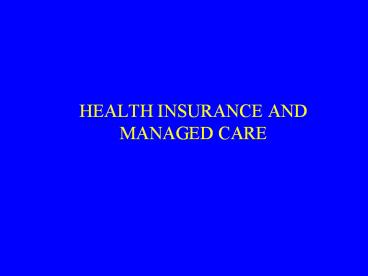HEALTH INSURANCE AND MANAGED CARE PowerPoint PPT Presentation
Title: HEALTH INSURANCE AND MANAGED CARE
1
HEALTH INSURANCE AND MANAGED CARE
2
Social Security and the changes in the health
sector
- Changes demographic, sociological, economic and
technical progress - A search for new methods of organisation for
control of expenditure, taking charge of global
health, quality of care, equity and solidarity - Recourse to MC
3
PLAN
- The challenges
- What is Managed Care (MC)?
- What we can learn from the experience of a few
countries the United States, France, Great
Britain, Switzerland and Chile - Discussion
4
THE CHALLENGES
- For the players (the Social Security Department,
the patients, health professionals and the State)
- to optimise the care system
- Installing the prerequisites
- Information systems, coordination, Fmc, etc.
- The role of Health Insurance and MC
5
WHAT IS MANAGED CARE?
- Various methods depending on the countries
- One example of a definition
- a set of systems and techniques used by all
entities that deliver, administer or provide
insurance in the health sector, that controls or
influences the accessibility, use, quality, cost
and services of health for a given population - (American Medical Association)
6
WHAT IS MANAGED CARE? (end)
- The objectives quality of care at the best cost
- making players responsible for their decisions
and checking them - The characteristics of relationships between
Health Insurance, patients and health
professionals management and responsibility - A system for controlling the organisation of care
and expenditure
7
What we can learn from the experience of various
countries the UNITED STATES
- A comprehensive system of managed care
- Managed care in the Health Management
Organisations
8
What we can learn from the experience of various
countries the UNITED STATES (continued)
- The patients recourse to approved professionals,
orientation - The professionals practice under a very tightly
controlled contract - The tools managed services (a basket of goods
and services, care protocols, systematic analysis
of the acts carried out, etc.) and information
systems
9
What we can learn from the experience of various
countries the UNITED STATES (end)
- The impact of MC
- access to care
- equity
- the modernisation of Federal Health Insurance
- the behaviour of the patient
- the behaviour of the professional
10
What we can learn from the experience of various
countries FRANCE
- From the coordination of the partners to
contracts - From care networks to health networks
- From experimentation to contracting
11
What we can learn from the experience of various
countries FRANCE (continued)
- From care networks to health networks
- coordination of practices, continuity of care,
complementarity of the offer - one example the gerontology network for
dependent old people (Msa)
12
What we can learn from the experience of various
countries FRANCE (end)
- From experimentation to contracting
- Rights and commitments to quantified objectives
for professionals and patients (referral
doctors, agreement for the correct use of care,
etc.) - Improvement of the coordination of care (patient
file) - Continuing finance, information systems
13
What we can learn from the experience of various
countries GREAT BRITAIN
- The evaluation of the practices of the health
professionals - The development of the quality of care the
contract between the group practice and the
manager (Primary Care Trust) - Revalidation, annual evaluations, guidelines,
personalised Fmc, etc.
14
What we can learn from the experience of various
countries SWITZERLAND
- Making the patient responsible
- Managed care and the plurality of models
- The patient at the centre
- financial incitements
- training / information
15
What we can learn from the experience of various
countries CHILE
- Reorientation towards solidarity and equity
- The protection of the insured person faced with
the private insurance market - The management of contracts (duration of cover,
selection of the risks, right of cancellation)
16
DISCUSSION
- Managed care in the long term, a model that
encourages the junction between medicine and
prevention, better coherence of the system of
care, better taking in charge of the patient - Quality of care? Regulation of expenditure?
- For a choice of several approaches, associated
with a legibility of the values of Social
Security
17
END OF THE PRESENTATION
- THANK YOU FOR YOUR ATTENTION!

